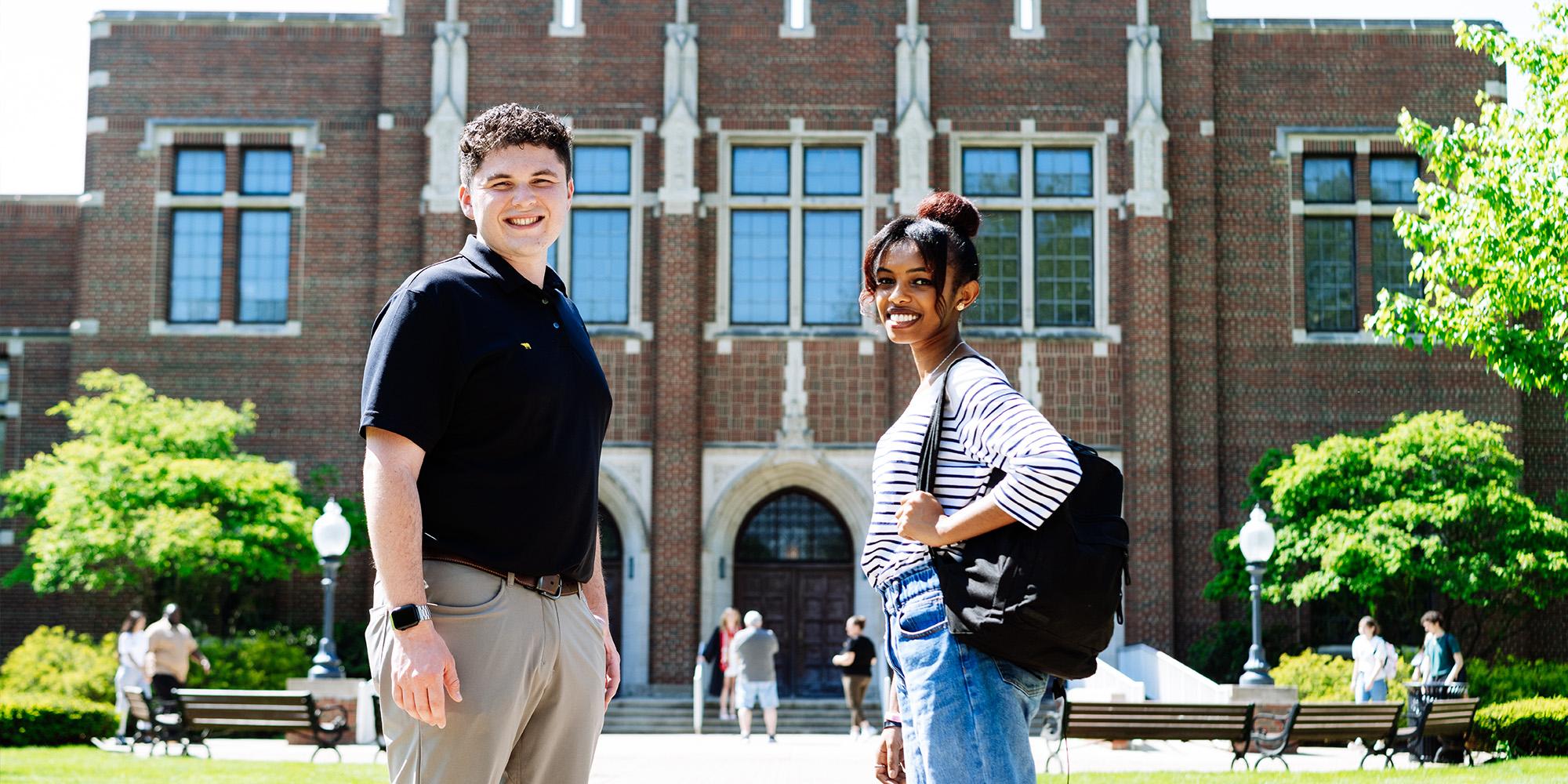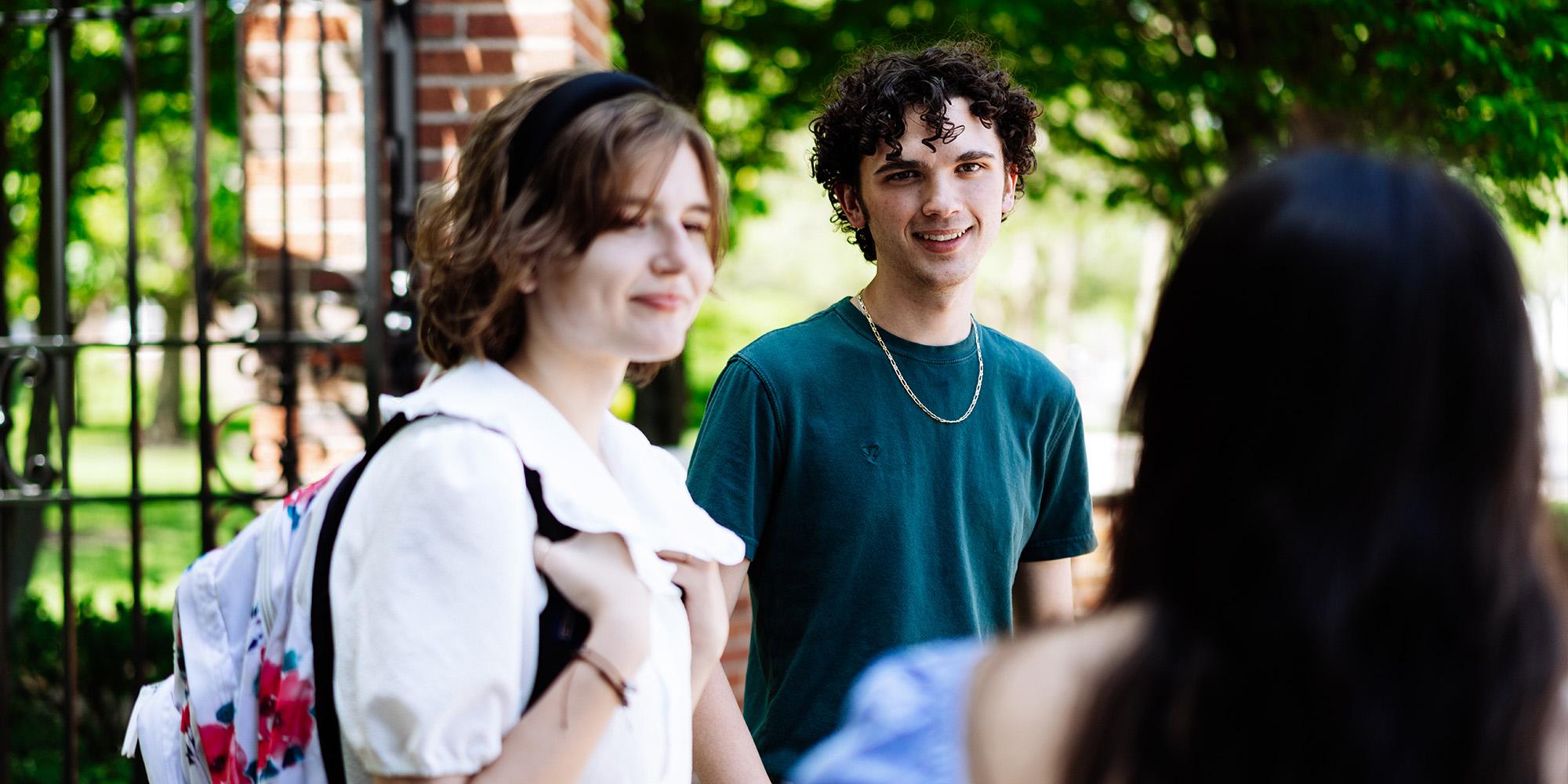Student to Faculty Ratio
Projected Growth Rate for Counselors over 10 Years
Our Faculty's Combined Years of Professional Experience
Choose Your Focus
School Counseling
Capital’s School Counseling track gives students the tools needed to succeed in a K-12 school.
After completing 64 class credit hours, as well as a 100-hour practicum and 600-hour internship, students earn a Master of Arts in Education degree. School Counselors take the Ohio Assessments for Educators School Counselor Test through the Ohio Department of Education and earn a Professional Pupil Services license specializing in school counseling.
Clinical Mental Health
The Master of Arts Clinical Mental Health track equips students to work in a variety of settings, including hospitals, community agencies, college counseling centers, and private practice. After completing 64 class credit hours, as well as a 100-hour practicum and 600-hour internship, students earn a Master of Arts in Education degree. Clinical Mental Health Counselors take the National Counselor Examination and become a Licensed Professional Counselor per the Ohio Counselor, Social Worker, and Marriage & Family Board.
Explore this Program
In compliance with the state of Ohio requirements and professional standards, all students complete a 100-hour practicum experience and 600-hour internship (over the last full year). Because of Capital’s location in the thriving capital city of Columbus, there are a number of urban, suburban and rural school districts, as well as national and state agencies, within a short distance of Capital. In addition to teaching, faculty also work as professional counselors and engage their students’ learning through the lens of their own experiences.
Hybrid courses allows Capital to offer classes that better fit the working adult a variety of lifestyles. It minimizes the amount of time students need to be on campus and focuses part of the work online. The number of face-to-face classes vary from course to course ranging from five to eight. Typically, students are on campus two of every three weeks for classes for two nights during the week (and weekly for theories of individual counseling, practicum and internship courses). The in-class time is supplemented with online lectures, videos, readings, reflections, and other alternatives to learning that allow in-class time to be more hands-on and focused. Students can anticipate being on campus an average of two nights per week.
Capital’s School Counseling program gives students the tools needed to succeed in a K-12 school.
After completing 64 class credit hours, as well as a 100-hour practicum and 600-hour internship, students earn a Master of Arts in Education degree. School Counselors take the Ohio Assessments for Educators School Counselor Test through the Ohio Department of Education and earn a Professional Pupil Services license specializing in school counseling.
The Master of Arts Clinical Mental Health program equips students to work in a variety of settings, including hospitals, community agencies, college counseling centers, and private practice. After completing 64 class credit hours, as well as a 100-hour practicum and 600-hour internship, students earn a Master of Arts in Education degree. Clinical Mental Health Counselors take the National Counselor Examination and become a Licensed Professional Counselor per the Ohio Counselor, Social Worker, and Marriage & Family Board.
The Council for Accreditation of Counseling and Related Educational Programs (CACREP) has accredited both the Clinical Mental Health Counseling and School Counseling programs. (2023 - 2031)
Admission into the Counselor Education program requires:
- A bachelor's degree or recognized equivalent from an accredited institution;
- A satisfactory grade point average (GPA), usually a minimum of 3.0 (B);
- Evidence of compatibility of professional goals with Capital University’s Counselor Education program as demonstrated through a writing sample and admissions interview;
- Evidence of ability to successfully complete the program; and
- A signed Statement of Assurance of Good Moral Character
Application Process
Submit an online application. The application requires: a writing samplestatement of intent, three (3) letters of professional reference, a current resume or curriculum vitaCV, and official transcripts from every institution from which you’ve received credit.
Request official transcripts from all previous institutions attended. You may choose to have your previous institution send your transcripts electronically OR as hard copies. If choosing to mail, send to:
Capital University
Office of Admissions
1 College and Main
Columbus, OH 43209-2394
Three letters of professional reference. As part of the application, you will include email addresses for your professional references. We will then contact them to obtain letters of reference. Letters should be from individuals who can attest to your preparedness for graduate level work and/or disposition for the counseling profession. These can be emailed to admission@667929.com or mailed to the address above.
Statement of Intent. Write a professional letter that addresses your personal decision to pursue a counselor education degree.
Apply for Financial Aid. If you plan on utilizing financial aid to help pay for your courses, complete the Free Application for Federal Student Aid (FAFSA). Capital’s FAFSA code is 003023.
Capital University’s Counselor Education program admits clinical mental health and school counseling students one time per academic year. Students will complete the application process starting in the fall of the year prior to admittance; upon invitation, complete the interview process in the spring prior to admittance; and, if accepted, will enroll in the fall semester.
Applicants who meet the Counselor Education program’s minimum requirements for admission will be invited for an in-person interview. Capital conducts individual and group interviews in an attempt to assess your cognitive, affective, and behavioral potential, and set you up for success in our program and in the field of counseling.
Sample Classes
- Introduction to the Profession
- Theories of Individual Counseling
- Counseling Diverse Populations
- Diagnosis of Mental and Emotional Disorders
- Counseling Children and Adolescents
- Clinical Assessment and Evaluation
- Wellness and Prevention Counseling
“I am not an A student historically speaking, but with the amazing guidance of each professor that I have had I have been able to understand the material with ease. My cohort class is like a close family and they all help each other along the way. The program allows for you to be on the same path through the program with other students. Therefore, you are never alone through any struggle that you face in your program or in life. This degree will help me better develop my counseling skills and be able to address individuals' needs appropriately.”
-AJ Rodriguez, School Counseling, Class of 2023
Frequently Asked Questions
A full-time student taking the recommended courses will finish in two-years. There are options to extend the coursework and internship to either a three-year or four-year plan. We typically recommend that students work towards the two-year plan, but you can work with your academic advisor to find what plan might work best with your situation.
Counseling is a hands-on profession and as such, it is important to gain real-world experience. Both experiences involve working directly in a school setting, coordinating with a supervisor, and connecting face-to-face with students in a variety of settings including individual and group counseling. The practicum is completed in the spring semester and entails 100 hours on-site with at least 40 hours of direct contact with students. The internship experience is 600 hours spread over both the fall and spring semester with at least 240 direct contact hours.
Perhaps – it is a case-by-case scenario. It often depends on the school/district and their willingness to be flexible, the availability of a qualified school counseling supervisor on-site, and enough freedom to gain the necessary hours. We request that you do not work therapeutically with students that you would otherwise engage with in the classroom or other situations.
Hybrid courses allow us to offer classes that better fit the working adult. It minimizes the amount of time students need to be on campus and focuses part of the work online. The number of face-to-face classes vary from course to course ranging from 5-8 (and weekly for practicum and internship courses). The in-class time is supplemented with online lectures, videos, readings, reflections, and other alternatives to learning that allow in-class time to be more hands-on and focused. Students can anticipate being on campus an average of two nights per week.
All classes are offered in the evening to accommodate student’s practicum and internships experiences. Classes begin at 4:00pm and at most two classes are on a single evening. Currently classes vary on Tuesday and Thursday evenings.
Absolutely not. Students come from a wide variety of backgrounds and undergraduate degrees. There are no specific prerequisites to enter into the program other than a desire to be a great professional school counselor!
Yes! A 3.0 minimum GPA is recommended in order to demonstrate the ability to do graduate level reading, writing, and research. However, we know everyone’s undergraduate experience is different and sometimes not reflective of one’s true ability. We work with applicants on a 1-to-1 basis to determine fit for the program and ability to succeed. If accepted with a sub-3.0 GPA, students would be placed on a probationary period in order to demonstrate the ability to complete quality graduate work.
We strive to not graduate excellent professional school counselors but also quality scholars. Research and graduate level writing are a part of nearly all courses and an understanding of APA formatting will be applied. But don't worry if you think you’re not quite there yet – we know not all undergraduate programs emphasize this component and area of learning. We will work with you to grow this skill.
Applicants who meet the Counselor Education program’s minimum requirements will be invited for an in-person interview. We believe it is very important to meet and learn about our potential students on a personal level, so yes, an interview is required as part of the admission process. This also gives you an opportunity to make sure that this is a fit for you as well. We are mutually committing to one another for at least two years so it is important to make sure everyone involved is fully informed and confident in the decision.

Request Information
Request Information
Schedule a Visit
Schedule a Visit
Apply to Capital
Apply Now